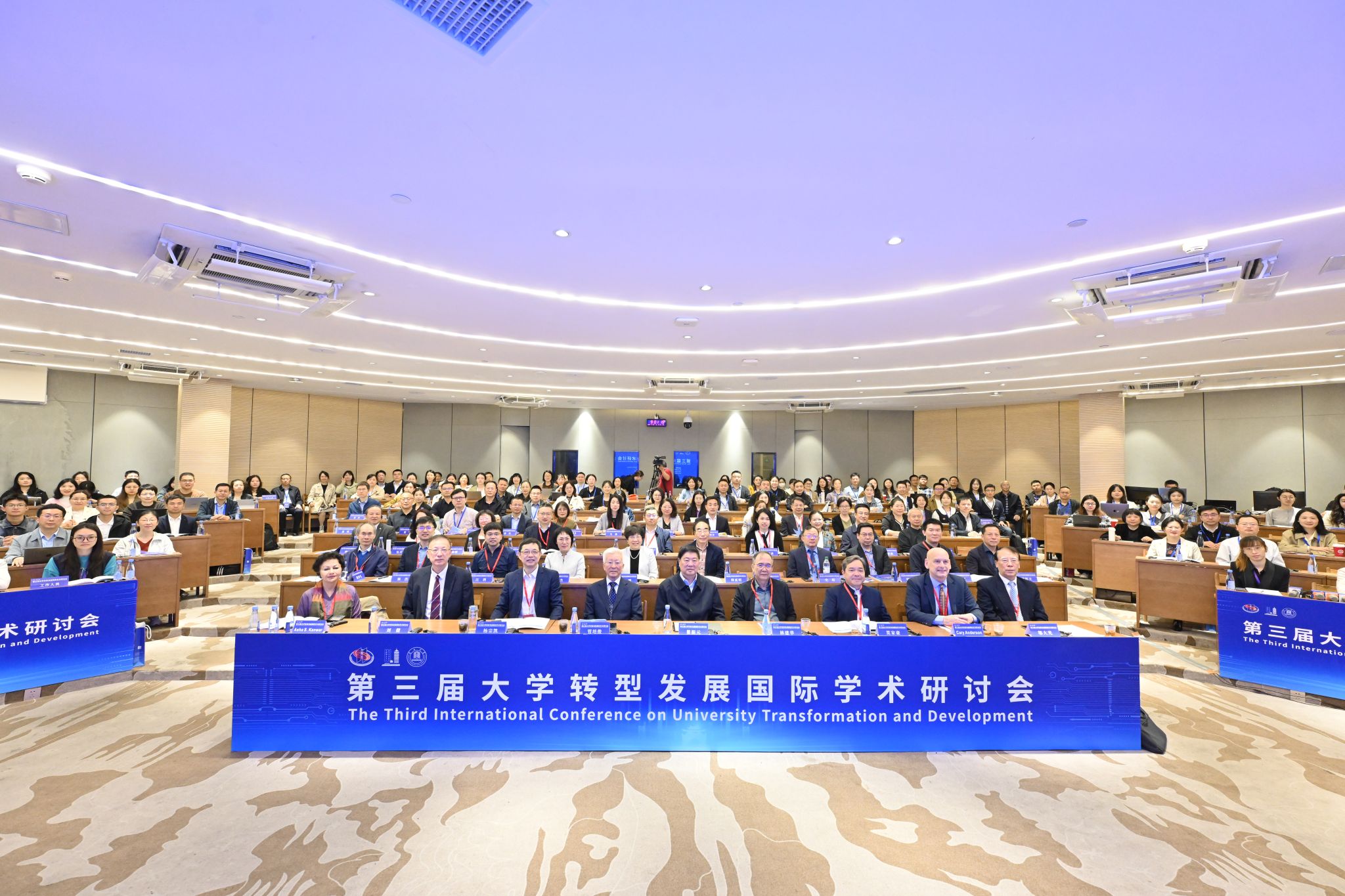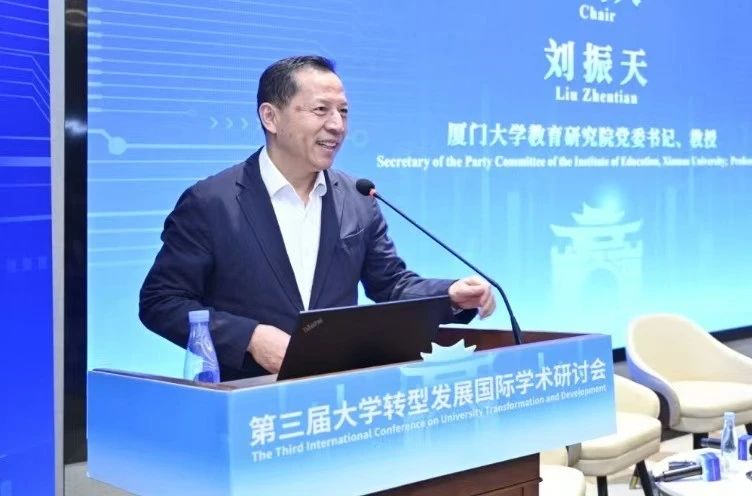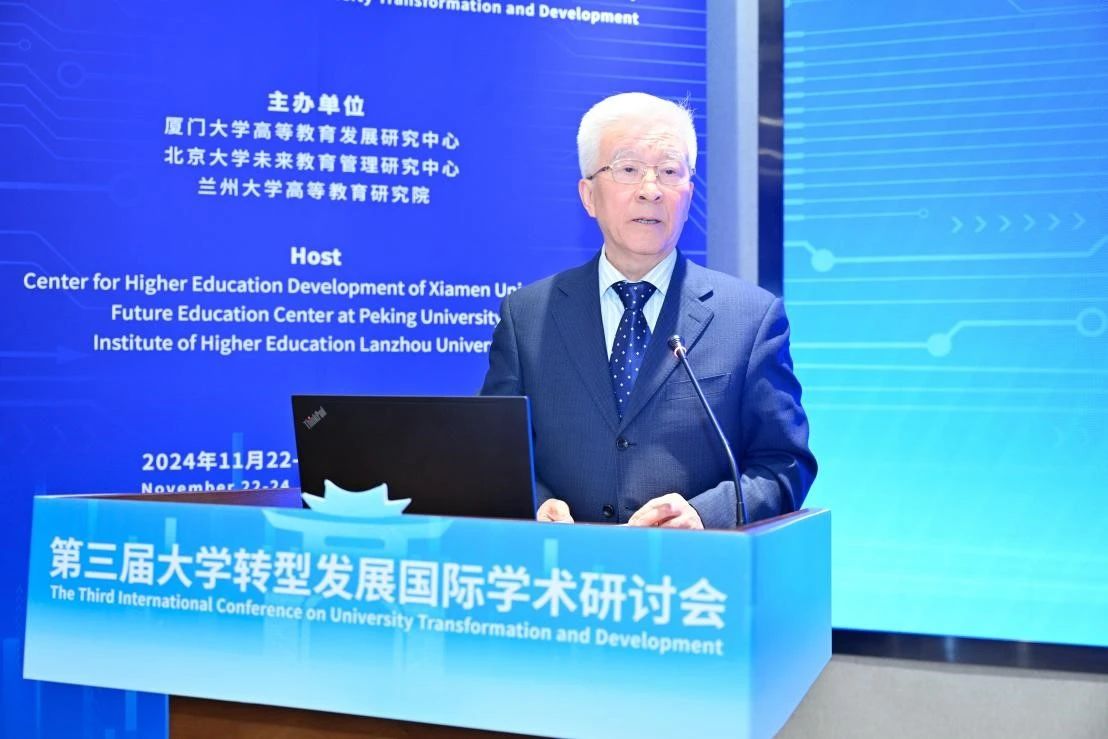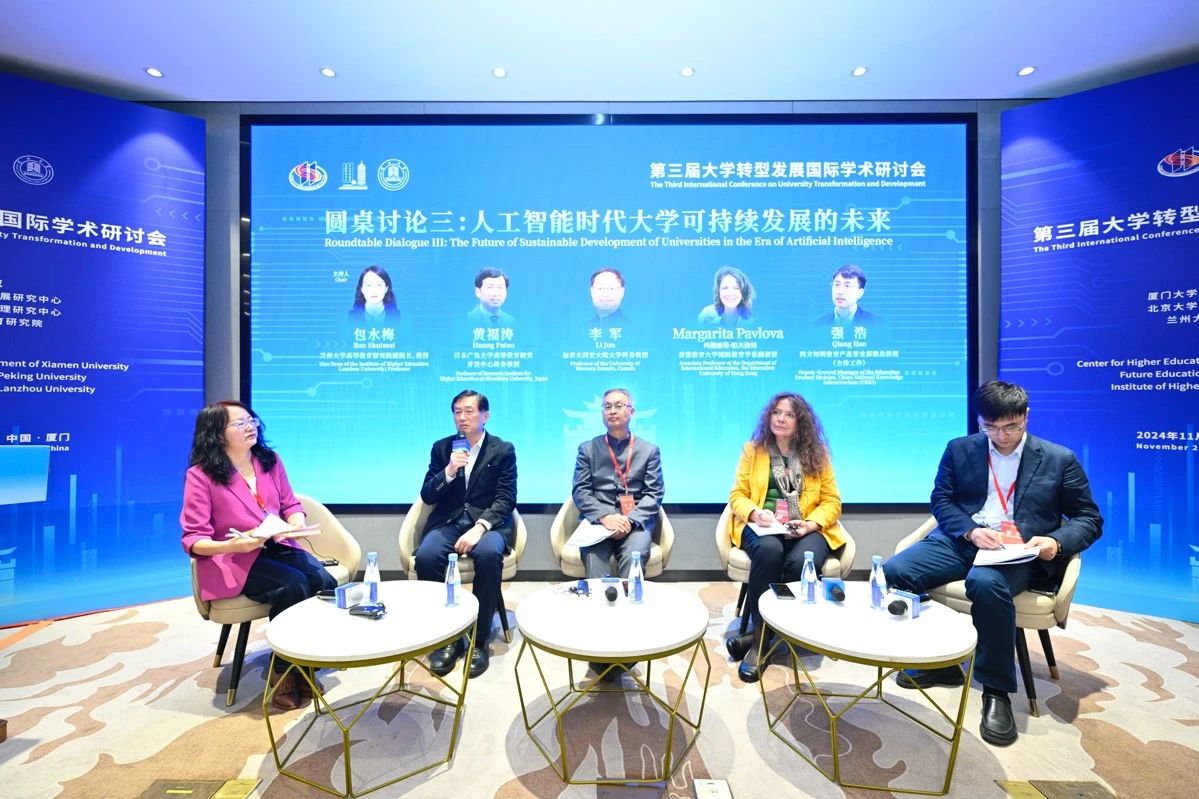From November 22nd - 24th , 2024, “The 3rd International Academic Symposium on University Transformation and Development”, co-hosted by the Higher Education Development Research Center of Xiamen University, the Future Education Management Research Center of Peking University, and the Higher Education Research Institute of Lanzhou University, was successfully held at Xiamen University. With the theme of “University Transformation: New Trends, New Requirements, and New Forms in the Age of Artificial Intelligence”, this symposium included a series of events such as an opening ceremony, a main forum, a roundtable dialogue, a young scholars’ forum, and a closing ceremony. More than 200 representatives attended the symposium, including experts, scholars, teachers, and students from over 60 universities, research institutions, and enterprises at home and abroad.

On the morning of the 23rd, the opening ceremony was presided over by Professor Wu Daguang, Vice President of the Chinese Society of Higher Education, Distinguished Professor of Xiamen University, and Dean of the Higher Education Research Institute of Lanzhou University.

In his welcome speech, Professor Liu Zhentian, Secretary of the Party Committee of the Institute of Higher Education at Xiamen University, stated that artificial intelligence (AI) is driving a new round of scientific and technological revolution, and universities need to actively explore transformation paths to contribute to the digital and intelligent process. In recent years, the Higher Education Development Research Center of Xiamen University has actively promoted research on digital higher education and achieved fruitful results. He expressed his expectation that participating experts would speak freely and offer suggestions for the digital development of higher education and teaching reform.

In his speech, Guan Peijun, Vice President of the Chinese Society of Higher Education, stated that to accelerate the implementation of AI-enabled initiatives, it is necessary to comprehensively promote the in-depth integration of higher education and intelligent technology. He put forward five key directions:
1. Promote AI to empower educational transformation and optimize the innovative development of university teaching;
2. Build smart learning spaces to facilitate the reform of talent cultivation models;
3. Implement digital education governance to advance the modernization of education governance systems and governance capabilities;
4. Emphasize data-driven approaches and algorithm integration to reshape new paradigms for scientific research;
5. Advance collaborative governance of intelligent education to move toward a bright future of win-win cooperation.

At “The 3rd International Academic Symposium on University Transformation and Development”, Lin Jianhua, former President of Peking University and Director of the Future Education Management Research Center of Peking University, reviewed the background and evolution of the three symposiums in his speech. He believed that under the pressure of technological and social changes, universities should actively adapt to the wave of the artificial intelligence era and cultivate students who can cope with future challenges and have innovative abilities. He hoped that through this symposium, it would promote the exchange of ideas and open up new ideas for the transformation of future education.

At the main forum on the morning of the 23rd, Qu Zhenyuan, former Party Secretary of China Agricultural University and President of the 6th Council of the Chinese Society of Higher Education, Yang Zongkai, President of Wuhan University of Technology and Chairman of the Expert Advisory Committee on Education Digitalization of the Ministry of Education, Mo Jiahao, Executive Vice President for Academic and Research Affairs of The Hang Seng University of Hong Kong, Liu Jian, a member of the 13th Fujian Provincial Committee of the Chinese People's Political Consultative Conference, Deputy Director of the Education, Science, Culture, Health and Sports Committee, and former Deputy Director (at the level of Director) of the Fujian Provincial Department of Education, Cary Anderson, Executive Vice President of Wenzhou-Kean University, and Li Li, Dean of the Higher Education Research Institute of iFLYTEK Co.Ltd, respectively delivered reports on the topics of “Breaking through Three Limitations and Actively Promoting the In-Depth Integration of Artificial Intelligence and Education from a Broader Perspective”, “Educational Digitalization Empowers the Modernization of University Governance: The Exploration and Practice of Wuhan University of Technology”, “AI and Postgraduate Education: The Hang Seng University of Hong Kong Experience”, “Undergraduate Major Adjustment Strategies from the Perspective of University Transformation”, “More Sustainable AI: An Imperative”, and “University Digital Transformation and Cultivation of Innovative Talents in the Era of General Artificial Intelligence”. The main forum was presided over by Professor Lin Jianhua.
In the roundtable forum session, Mo Jiahao, Cary Anderson, Li Li, and Wu Di, Deputy Director of the National Engineering Research Center for E-Learning and the professor at Central China Normal University, had an exchange and discussion on the theme of “Artificial Intelligence Technology Empowering University Governance” and shared the specific practices of university governance. The roundtable forum was presided over by Professor Wang Shutao, Deputy Dean of the Institute of Higher Education at Xiamen University.

At the main forum in the afternoon of the 23rd, Professor Chen Li, former Vice President of Beijing Normal University and Vice President of the China Educational Technology Association, Professor Yan Guangcai, Director of the Institute of Higher Education at East China Normal University and Chairman of the Specialized Committee on Higher Education of the Chinese Society of Higher Education, Visiting Professor Asha Singh Kanwar at the Smart Learning Institute of Beijing Normal University, Professor Bie Dunrong, Dean of the Institute of Education at Xiamen University, Shi Chao, Founder and Chairman of Chaoxing Group, and Associate Professor Tim London, Director of Learning and Teaching at the Future Education College of Xi’an Jiaotong-Liverpool University, respectively delivered reports on the topics of “The New Knowledge View and Curriculum Form Innovation in the Intelligent Era”, “A Cold Thinking on the Myths of AI in Education”, “Sustainable Higher Education in the Age of AI”, “The Connotation and Ecological Construction of Smart Education”, “Artificial Intelligence: The Origin of an Educational Revolution”, and “As Artificial Intelligence Improves and Diversifies, What Will Be Left of Higher Education”. The main forum was presided over by Professor Zhao Tingting, Deputy Dean of the Institute of Education at Xiamen University.
In the roundtable forum session, Chen Li, Bie Dunrong, Asha Singh Kanwar and Shi Chao had a discussion on the theme of “The New Form of University Education and Teaching in Artificial Intelligence Era”, and had a dialogue and exchange with the audience on issues such as whether higher education should also empower artificial intelligence and how to effectively apply the theory of artificial intelligence empowering higher education to practice. The roundtable forum was presided over by Fan Xiaoxian, a member of the editorial board and associate senior editor of the “Journal of East China Normal University (Educational Sciences)”.

In the evening of the 23rd, two young scholars' forums were held simultaneously. 20 representatives from universities such as Tsinghua University, Zhejiang University, Shanghai Jiao Tong University, Xiamen University, Lanzhou University, Hunan University, Minzu University of China and Hunan Normal University made special speeches on the transformation of teachers' curriculum ability in the era of artificial intelligence, the construction of an independent knowledge system of higher education, and the international comparison of university development, and had interactive exchanges with the participating representatives. The first young scholars’ forum was presided over by Associate Professors Li Chengfeng and Chen Xingde of the Institute of Education at Xiamen University, and commented by Professor Wang Hongcai of the Institute of Education at Xiamen University and Dean Guo Lijun of the College of Education at Hunan Agricultural University. The second young scholars’ forum was presided over by Associate Professors Wen Jing and Chen Bin of the Institute of Education at Xiamen University, and commented by Associate Professor Han Shuangmiao of the College of Education at Zhejiang University and Associate Professor Guo Yirong of the Institute of Education at Xiamen University.
On the morning of the 24th, at the main forum, Huang Futao, a tenured professor at the Center for Research and Development in Higher Education of Hiroshima University in Japan, Associate Professor Pavlova Margarita from the Department of International Education at the Education University of Hong Kong, Jun Li, a tenured professor at Western University in Canada, Han Yanming, a distinguished professor at Shandong Normal University and former president of Linyi University, Qiang Hao, the deputy general manager (in charge) of the Education Product Division of Tongfang Knowledge Network, Professor Wang Cheng from the College of Chemistry and Chemical Engineering at Xiamen University, and Associate Professor Assumpta Aneas, the director of the Department of Educational Research and Evaluation Methods at the Faculty of Education of the University of Barcelona in Spain, respectively delivered reports on the topics of “From Scientific and Technological Revolution to Artificial Intelligence: The Historical Logic and Future Direction of University Transformation”, “Addressing SDG by Universities: Exploring AI for the Digital and Green Transition”, “Redefining the University in the Digital Age: Taking the International Training Program for Doctor of Education (Ed.D) as an Example”, “The Response of University Teaching in the AI Era”, “The Practice and Exploration of the Partial Scenario-based Application of Large Models in the Field of Education”, “Artificial Intelligence Empowering Chemistry Education: Narrowing the Knowledge Gap for Future Scientists”, and “AI Technologies and Engagement: A Strategic Alliance at Universities”. The main forum was presided over by Professor Wu Wei, the deputy director of the Center for the Study of Higher Education Development at Xiamen University.
In the roundtable forum session, Huang Futao, Li Jun, Pavlova Margarita, and Qiang Hao focused on the theme of “The Future of University Sustainable Development in the Age of Artificial Intelligence”, and conducted exchanges and discussions on issues such as the sustainable application of artificial intelligence and artificial intelligence ethics. The roundtable forum was hosted by Professor Bao Shuimei, Vice Dean of the Higher Education Research Institute of Lanzhou University.

The closing ceremony on the morning of the 24th was presided over by Professor Liu Zhentian. He expressed sincere gratitude to all experts and scholars for their active participation and the hard work of the staff, and stated that the achievements of the conference had provided important insights and valuable experience for the transformation and development of higher education.
In her concluding remarks, Professor Bao Wei, Director of the Center for the Study of Higher Education Development at Xiamen University, stated that it is the responsibility of academic researchers to conduct scientific and systematic analyses of the teaching forms of artificial intelligence in universities and the organizational governance forms of institutions from a comprehensive perspective, and to promote dialogue and understanding among different parties. She sincerely thanked all the participants for their presence and active participation, which made this forum a high-standard and high-level academic event.
Professor Lu Caichen, Vice Dean of the Higher Education Research Institute of Lanzhou University, delivered a speech on behalf of the Higher Education Research Institute of Lanzhou University as the representative of the next host. He looked forward to returning to Lanzhou, on the banks of the Yellow River, and continuing to deepen exchanges at the next conference to jointly promote university transformation and educational innovation.

The “University Transformation and Development Seminar” is a series of academic conferences jointly initiated by the Center for the Study of Higher Education Development at Xiamen University, the Center for Future Education Management at Peking University, and the Higher Education Research Institute of Lanzhou University. The first conference was held in Lanzhou in June 2021, and the second conference was held in Hangzhou in July 2023. The fourth conference will be held in Lanzhou in 2025.
Text by: Xiong Letian, Wang Tianyu, Guo Yirong, Lin Hanyan
Image via: Institute of Higher Education, Xiamen University
Translated by:Dai Lan